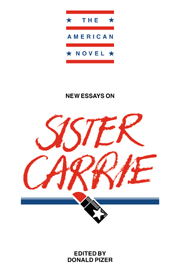Book contents
- Frontmatter
- Contents
- Series Editor's Preface
- Note on the Text
- 1 Introduction
- 2 Carrie's Blues
- 3 A Portrait of the Artist as a Young Actress: The Rewards of Representation in Sister Carrie
- 4 Sister Carrie: The City, the Self, and the Modes of Narrative Discourse
- 5 Who Narrates? Dreiser's Presence in Sister Carrie
- Notes on Contributors
- Selected Bibliography
2 - Carrie's Blues
Published online by Cambridge University Press: 05 June 2012
- Frontmatter
- Contents
- Series Editor's Preface
- Note on the Text
- 1 Introduction
- 2 Carrie's Blues
- 3 A Portrait of the Artist as a Young Actress: The Rewards of Representation in Sister Carrie
- 4 Sister Carrie: The City, the Self, and the Modes of Narrative Discourse
- 5 Who Narrates? Dreiser's Presence in Sister Carrie
- Notes on Contributors
- Selected Bibliography
Summary
… the curious effect which Carrie's blues had upon the part.
-Sister CarrieWHAT most struck Sister Carrie's first readers was the clarity and understanding that Dreiser brought to the figure of Hurstwood. The novel's heroine, however, puzzled many reviewers, who found her to be, as William Marion Reedy put it, “real” but “paradoxically … shadowy.” Words like “shadowy,” “nebulous,” “paradoxical” expressed the uneasiness early critics felt about the character. Even the book's admirers tended to think that its “extraordinary power … has little to do with the delineation of foolish, worldly wise Carrie.” There was, moreover, little agreement about what sort of woman Carrie represented: some saw her as “calloused” and driven by “hard cold selfishness,” while others used terms of endearment that matched Dreiser's own sentimental language for his “waif amid forces.” Ninety years later, the situation hasn't changed much. The contradictions in Carrie's character – a narcissistic young woman in whom self-interest runs high, yet who on “her spiritual side … was rich in feeling … for the weak and the helpless” – have encouraged critics to see her as everything from a Victorian vamp and golddigger to “a naive, dreaming girl from the country, driven this way and that by the promptings of biology and economy, and pursued on her course by the passions of her rival lovers.”
Some readers attribute the wide range of critical responses to what they consider the young author's shaky grasp of Carrie's makeup.
- Type
- Chapter
- Information
- New Essays on Sister Carrie , pp. 23 - 42Publisher: Cambridge University PressPrint publication year: 1991
- 2
- Cited by

